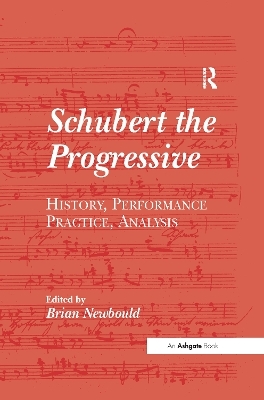
Schubert the Progressive
Routledge (Verlag)
978-1-138-25166-3 (ISBN)
The eleven essays that comprise this volume represent some of the most significant strands of current Schubert research. Arising from an international conference organized by the Schubert Institute (UK) and the University of Leeds in 2000, the emphasis of the papers is on issues of performance practice, analysis and hermeneutics.
In the opening essay of the book, Charles Rosen illuminates some of Schubert's compositional practices and their implications for performers. Further performance problems are explored by Walther Dürr who highlights the paradox between Schubert's precise notation of pitches and rhythm and his imprecision in relation to dynamics and articulation. As Roy Howat makes clear in his essay, the performer needs to read between the lines of even the best Schubert editions.
Aspects of Schubert's style are explored in other essays. Clive McClelland discusses the composer's use of ombra style, while Brian Newbould examines Schubert's techniques of compression and expansion as illustrated in his dances and in sonata movements. Robert Hatten explores the G major Piano Sonata as pastoral, and James Sobaskie and Nicholas Rast provide complementary analyses of the A minor Quartet.
The organization of musical time in Schubert and his relationship in this regard to later composers is the subject of Susanne Kogler's essay, while Walburga Litschauer discusses Schubert's early piano sonatas and previously unknown versions of them. Various enigmas surrounding Schubert's life and music are discussed by Roger Neighbour.
With contributions from both internationally acclaimed and younger scholars, this volume represents a further step in the multifaceted direction that Schubert research is taking.
Brian Newbould
Contents: Preface; Schubert and the example of Mozart, Charles Rosen; Death and the composer: the context of Schubert's supernatural Lieder, Clive McClelland; Notation and performance: dynamic marks in Schubert's manuscripts, Walther Dürr; Tonal implication and the gestural dialectic in Schubert's A Minor Quartet, James William Sobaskie; Schöne Welt, wo bist du?: motive and form in Schubert's A Minor String Quartet, Nicholas Rast; Timelessness and ‘released time’ — Franz Schubert and composition today, Susanne Kogler; Unknown versions of Schubert's early piano sonatas, Walburga Litschauer; Cornered in the middle eight: dance miniaturism vis-à-vis sonata, Brian Newbould; Reading between the lines of tempo and rhythm in the B Flat Sonata, D960, Roy Howat; The Doppelgänger revealed?, Roger Neighbour; Schubert's Pastoral: the Piano Sonata in G Major, D894, Robert Hatten; General Index; Index of works by Schubert referred to in the text.
| Erscheinungsdatum | 07.01.2017 |
|---|---|
| Verlagsort | London |
| Sprache | englisch |
| Maße | 156 x 234 mm |
| Gewicht | 294 g |
| Themenwelt | Kunst / Musik / Theater ► Musik ► Klassik / Oper / Musical |
| ISBN-10 | 1-138-25166-6 / 1138251666 |
| ISBN-13 | 978-1-138-25166-3 / 9781138251663 |
| Zustand | Neuware |
| Haben Sie eine Frage zum Produkt? |
aus dem Bereich


